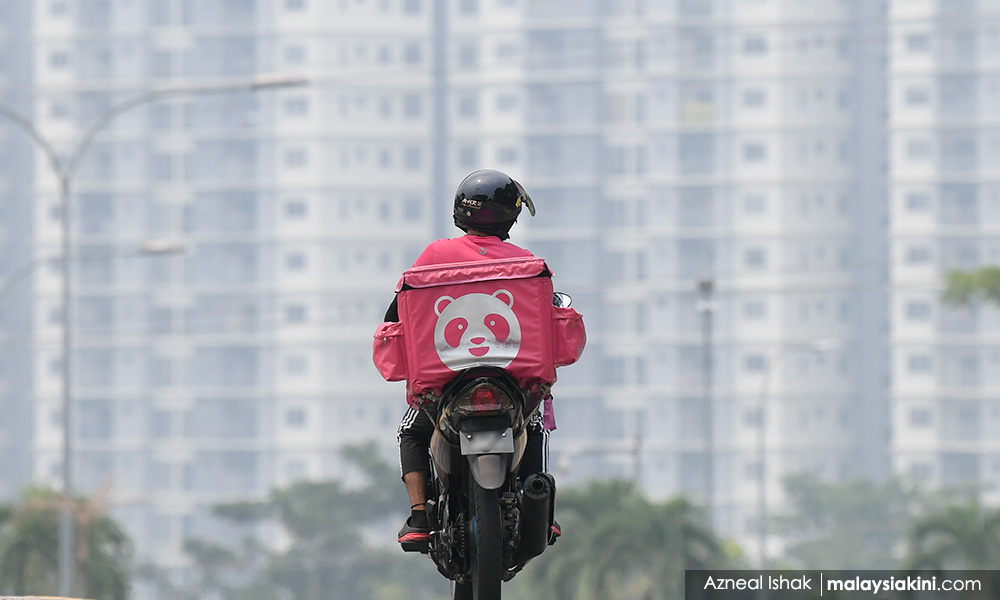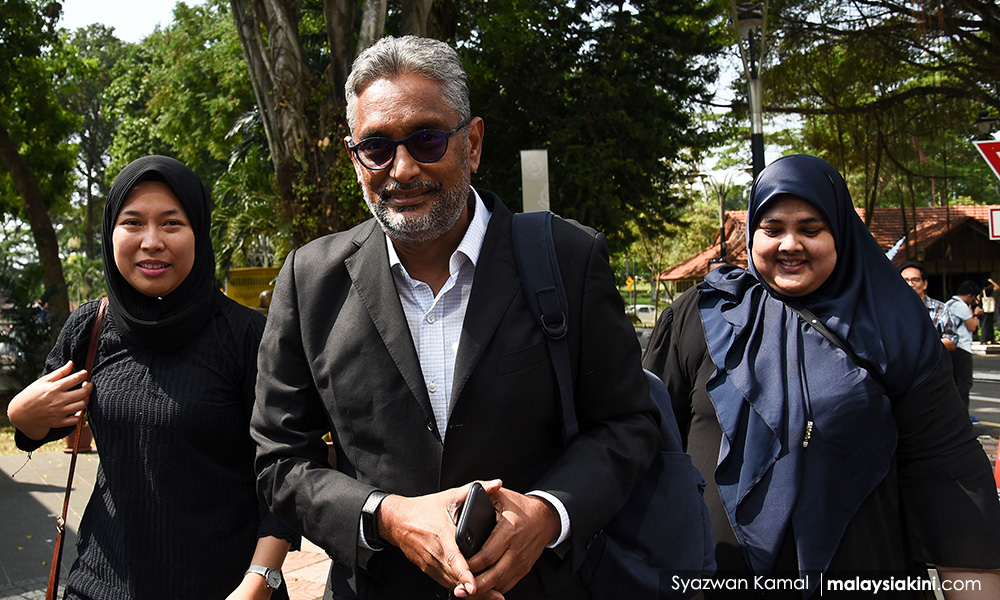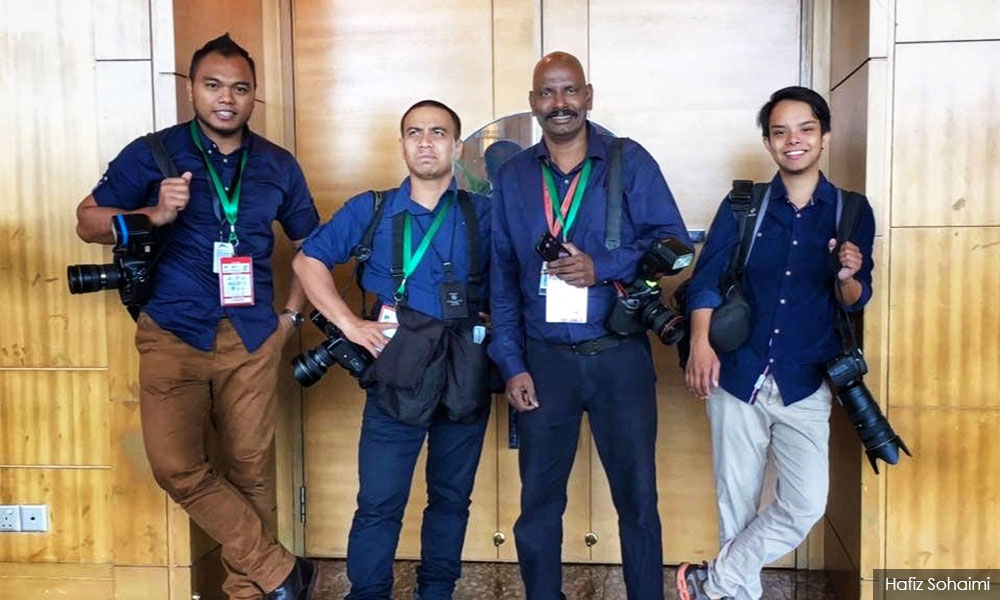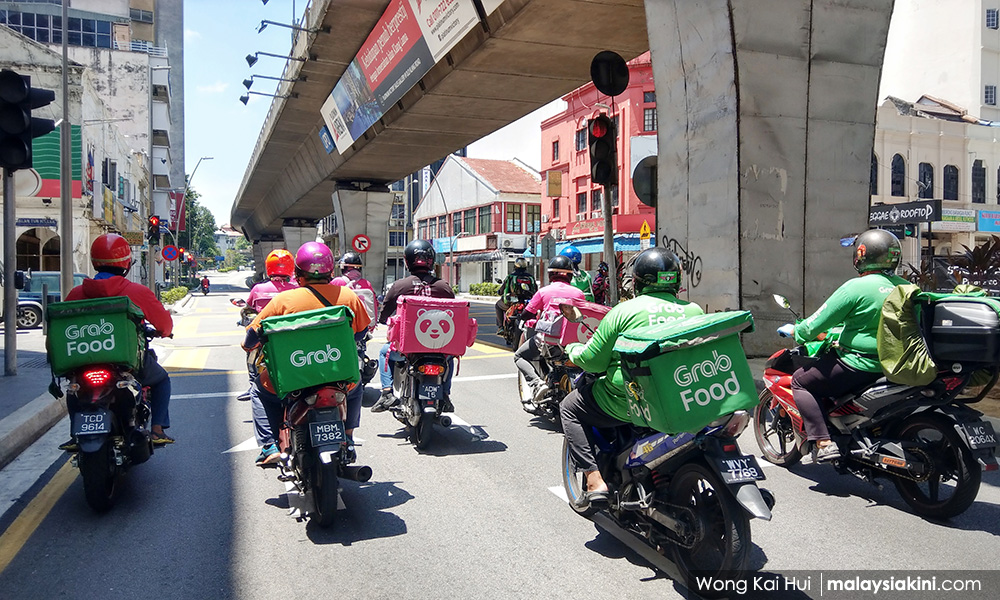
“Normally, I go to work at about 5am every day and except for a lunch break, I drive until evening. The goal I set is to earn RM300 per day,” 45-year-old e-hailing driver Loke Soke Lam (photo above) told Malaysiakini.
He was born and raised in Ipoh, Perak and was working in the oil and gas industry in Singapore for 20 years. His monthly salary at the time was about RM10,000.
A few years ago, he decided to come back to Malaysia to continue his career in the industry, but as there was often employment gaps between the oil pipeline projects, he began to work as an e-hailing driver as his main source of income during the gaps.
Before the Covid-19 pandemic, he drove for nearly 10 hours a day, which may be longer than the average traditional full-time employee.
Back then, his monthly income as a full-time e-hailing driver was about RM6,000 if he deducted the expenses such as petrol, insurance and car maintenance. But his income plummeted in the wake of the pandemic.
As the Covid-19 pandemic sweeps across the globe, the world has had to adapt to a “new normal”.
Due to the movement restrictions in various countries, the global economy has slumped and market demand has plunged, forcing many local enterprises to explore cost-saving options.
Gig economy
The National Security Council (NSC) has also pointed out that the new normal after Covid-19 will include working from home, online learning as well as the rapid development of the gig economy.
But the emergence of the gig economy in Malaysia is nothing new.
From the increase in contracted employees and dispatched labour, the trend of workers turning to providing “on-demand services” has been gaining traction in the gig economy over the past decade.
In Malaysia, the e-hailing service was launched seven years ago. This on-demand economic model has since been replicated in numerous industries in the country.
On-demand platforms found online in Malaysia now include services such as house maintenance, interior design, photographers, data entry, promoter, waiters and even high-skilled jobs such as caregivers, doctors, physiotherapists and more.

It is highly likely that there will be a faster transition from traditional employment to gig economy work in the near future, said Susan Leong, who is a senior lecturer at the School of Arts and Social Sciences of Monash University Malaysia.
“Indeed, there will be more jobs that will become gig economy work, or rather, on-demand work.
"The highly skilled jobs and low-skilled jobs are more likely to become gig work,” she said.
However, she said, some middle-level management and administrative work which combines high-skill and low-skill capabilities are less likely to become on-demand gig work.
When a solution becomes a problem
When the gig economy first emerged, it was hailed as innovative and creative, with some even celebrating it as the solution to unemployment.
In 2016, then prime minister Najib Abdul Razak urged the poor to become e-hailing drivers to make a living when tabling the Budget in Parliament.
As recent as last year, then youth and sports minister Syed Saddiq Syed Abdul Rahman also expressed his optimism that motorcycle ride-sharing services can also effectively create jobs for youths and enable them to upskill themselves as well as afford higher education.
On-demand platforms have indeed attracted many youths to join as gig workers as they promote a “free and flexible” working lifestyle.
However, these platforms tend to define the workers as their “partners” rather than a traditional employment relationship.
As such, any social protection for the workers or employees in the Malaysian legal system is not applicable to gig economy workers.
Fast forward a few years since the proliferation of on-demand platforms and it seems like what was once hailed as an innovative solution has now become a new problem in Malaysia.
This comes as a growing proportion of the working population is now excluded from the existing social protection system.
“Currently, there’s no regulation which can be applied to gig workers. The Employment Act only applies to so-called employees,” said former Malaysian Bar president Ragunath Kesavan (photo, centre) in an interview with Malaysiakini.

Under the existing laws, the entitled rights of the employees include minimum wage, public holidays, annual leaves, termination and lay-off benefits.
Ragunath said there is an urgent need for the government to regulate and impose certain obligations on companies to ensure that gig workers have social security, especially now that they have become a significant proportion of the working population.
“Malaysia currently has more than 13,000 people on Foodpanda, 10,000 people on Grab and more than 160,000 are on e-hailing.
“In terms of statistics, in the next five years, it is projected that the gig economy participants will account for more than 40 percent of the workforce.
“…The government must protect this large number of gig economy workers. They currently have about 200,000 people, which is a huge number,” he said.
He urged the government to set a minimum standard of employment to provide basic protection for gig workers and also to ensure a certain form of accountability in the sector.
“We must provide at least the minimum standard of social security for the workers in the gig economy.
“For now, even Socso (Social Security Organisation) for instance, it’s voluntary, it’s not a requirement for every gig employee or worker to have a Socso account,” he said.
Ragunath also suggested that the government set a minimum wage for gig workers and control the amount of commission taken by the platform.
In a normal employment contract, he said, workers can also get benefits such as overtime rates, which the gig workers do not enjoy for now.

‘Full-time’ gig workers
When on-demand platforms first entered the market, such work was portrayed as a “free and flexible” source of supplementary income.
However, research statistics show that more than half of gig workers in Malaysia can be regarded as “full-time workers” when measured in terms of working hours and days.
According to a research done by think tank The Centre at the end of 2019, more than 60 percent of respondents spend more than eight hours a day on gig work and 87 percent of respondents participate in gig work for five days or more per week.
Meanwhile, 88 percent of the respondents indicated that the income from their gig work is an important or extremely important source of income for them.
The study also claimed that as of December 2019, there are an estimated 250,000 gig workers in the country who rely on the income from the on-demand work.
Solution to unemployment?
It is undeniable that the gig economy has provided income opportunities for those who are jobless.
However, data shows that the problem of unemployment has not been significantly alleviated in the past seven years since the emergence of the gig economy in Malaysia.
Statistics from Bank Negara showed that the average unemployment rate of the past 10 years is 3.3 percent, without any notable decrease.
As of February 2020, the unemployment rate is still at 3.3 percent, which means that about 525,000 people are unemployed.
A study by Khazanah Research Institute (KRI) also showed that the youth unemployment rate has continued to rise over the past seven years and hit a peak of 10.92 percent in 2018, which is triple the average unemployment rate in Malaysia.
The same study also showed that 15 to 24-year-old unemployed individuals continue to make up the largest share of total unemployed individuals, accounting for nearly 60 percent.
Meanwhile, 25 to 54-year-old unemployed individuals made up 40 percent of the total and those who were 55 to 64 years old accounted for less than 1.5 percent.

Not a permanent solution
The gig economy can only be a temporary solution but not a permanent one for the unemployment problem in Malaysia, stressed Leong.
However, even if it is just a temporary solution, she believes that the government should intervene to ensure social protection for gig workers.
"The government should intervene in the gig economy because it is being taken up by a lot of Malaysians, especially younger Malaysians.
"I believe that these young people initially took this as a sort of stopgap source of income and they continued to find work (elsewhere).
"But due to the unemployment problem, they continue to do the gig work and it has become their main source of income
"I don't think there's anyone who starts out working in the gig economy thinking that it will be their career, but the reality slowly sets in," said the senior lecturer.
Leong said that the idea of a gig economy was first proposed by a group of highly-skilled talents such as computer programmers and designers, who tried to pursue freedom away from the traditional 9-to-5 jobs.
“In fact, it goes back to almost 20 years ago but it was not called the gig economy. They advocated an independent and flexible working model, but the difference is that if you have high skills, your rate of payment is much higher and you can work four hours a week,” she said.
On the contrary, the gig economy in Malaysia still focuses on lower-paid and low-skilled work and it is unable to achieve the freedom as imagined 20 years ago, she said.
‘I wouldn’t want to deliver food my whole life’
‘I wouldn’t want to deliver food my whole life’
Aside from trying to make ends meet, some workers may seek a sense of self-worth or of accomplishment at work.
Hafiz Sohaimi, 29, is a professionally trained photojournalist who had worked in the news industry for over six years and he was also a part-time GrabFood delivery rider.
However, in a situation out of his control, Hafiz lost his job during the mass layoffs by Media Prima Berhad last year.
In order to make a living and pay the bills, Hafiz (photo) had to turn his part-time job as a delivery rider into a full-time job after his retrenchment.

Though he spends a lot of time waiting as both a photojournalist and a GrabFood rider, he said being a photojournalist was a lot more fulfilling as he could use his professional skills when covering news events.
“Being a photojournalist gives me a sense of accomplishment. When we are assigned to work, we may not be able to predict what will happen.
“For example, if Najib suddenly fell or burst into tears, the photojournalist will have to catch the moment. It is like documenting history.
“As journalists, we can witness things that people normally do not have the chance to see,” Hafiz told Malaysiakini in an interview back in January 2020.
On that day, he had just lost his job as a photojournalist.
“I don’t want to give up what I am passionate about, but we can’t just live with enthusiasm without money.
“I hope to continue to be a photojournalist. However, if there is no job opportunity, my life still has to continue,” he said.

Hafiz had his annual leave, overtime payments, various allowances, social insurances and retirement savings when he was a photojournalist.
Even when he was faced with retrenchment, he was entitled to a certain amount of financial compensation.
Acknowledging the lack of social protection for gig workers, he said being a GrabFood delivery rider is just a transition plan for him.
"Of course, I wouldn't want to be a food delivery rider for the rest of my life,” he said.
Hafiz has since found a new job as a photojournalist and ended his days of being a full-time food delivery rider. He is the lucky one among many skilled young Malaysians who are dependent on gig work.
According to The Centre’s research, which has a sample size of 411 qualified responses, 56 percent of full-time respondents have a degree in STPM or above.
The study also showed that about 20 percent of full-time gig workers have the intention to change jobs within one year while the remaining 80 percent plan to continue working on gig economy platforms for one year and above.

Over-romanticised employment?
Generational differences in the notion of work have often been used to explain the changes in the nature of employment.
The gig economy platforms often say that the younger generation is eager for an autonomous life free of the 9-to-5 convention, which the platforms can provide.
“I have come across lots of people who say, you know, ‘I want to be free and easy. I don’t want to have a 9-to-5 job, I only work when I want to work’, which really sounds very romantic and comforting," said Leong.
“The reality is that most of these people who can live without full-time work probably have a family they can depend on.
“...This kind of free life sounds very seductive, but it also depends on what you can do when you want to work.
“If the kind of work that you get is highly paid, let’s say RM200 or RM500 per hour, then it should be no problem. But if you get paid RM15 per trip, then this idea is just untenable."
As Malaysia’s gig economy is still dominated by low-skilled jobs, it may be difficult to achieve the romanticised expectation of a ‘free and easy’ job while still earning a living wage, she said.
As the nature of gig work is unreliable, she said, people may lose a sense of stability when more full-time employment gradually turns into on-demand gig work.
Financial, psychological or mental stress may occur at the individual level, she said, and there are consequences for the society as a whole if a high proportion of the population feels trapped in terms of their sense of well-being, Leong added.
If the unemployment or underemployment problem remains unsolved, it could lead to a rise in crime rates, mental health problems and even suicide.
“When many people feel that they are in a disadvantaged position, it will cause social unrest,” she said.
Gov't intervention necessary
The Covid-19 pandemic has highlighted how crucial social protection systems can help countries cope with the crisis and safeguard the most vulnerable in the community.
Currently, several gig economy platforms such as Grab have introduced voluntary insurance schemes for their workers, while Foodpanda provides free insurance for “active riders” - riders who have arranged to work for the next seven days on every Friday.

However, Ragunath said the voluntary insurance plan is not a good solution.
“The reason is simple. When you say it is a voluntary scheme, it means that the company doesn’t have to contribute,” he said.
He also pointed out that the insurance scheme proposed by certain platforms is not enough to solve the problem of labour rights within the gig economy as a whole.
“We need to have legislation to ensure that there is a universal standard,” he said.
The gig economy issue is a global one, Ragunath emphasised, and Malaysia does not need to be an “innovator of changes” as there are many jurisdictions that have already set precedents to ensure gig workers are protected.
“We must ensure that these platforms are properly accountable to society and workers,” he said.
New form of labour risk sharing
For example, in the United States, the New York City Council had passed a proposal establishing that ride-sharing drivers should earn a minimum rate of pay while in California, legislators approved a bill that requires companies like Uber to treat their workers as employees.
While it is necessary for the Malaysian government to intervene to provide adequate protection, she stressed that the crux of the problem is about who bears the cost.
“If it is the worker that is bearing all the cost, not the consumer, not the government, not the platform, then this is not a solution. It is just another way to make money by selling insurance to workers,” said Leong.
She suggested a fairer responsibility-sharing system where the structure of protection can be shared by the government, platforms, users and workers, instead of shifting the burden of major life risks – unemployment, health and old age – onto workers.
“People think that services like Grab seem to be cheaper. In fact, the costs of those rights never disappeared. The cost right now is being borne by the workers,” she said.
During the Pakatan Harapan administration, then prime minister Dr Mahathir Mohamad had indicated that the government was considering new legislation to regulate the gig economy.
A special committee comprising representatives from the Human Resources Ministry, the Youth and Sports Ministry and the Domestic Trade and Consumer Affairs Ministry had been set up to study this issue then.
After the Perikatan Nasional coalition came into power at the end of February, it remains to be seen whether the planned reforms for the gig economy will be continued or whether there are any new plans from the new administration.
No response was received from Human Resources Minister M Saravanan at the time of writing. - Mkini


No comments:
Post a Comment
Note: Only a member of this blog may post a comment.